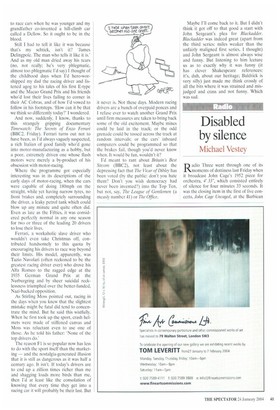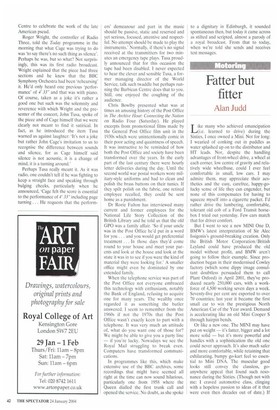Disabled by silence
Michael Vestey
Radio Three went through one of its moments of dottiness last Friday when it broadcast John Cage's 1952 piece for orchestra, 4' 33", which consisted entirely of silence for four minutes 33 seconds. It was the closing item in the first of five concerts, John Cage Uncaged, at the Barbican
Centre to celebrate the work of the late American pseud.
Roger Wright, the controller of Radio Three, told the Today programme in the morning that what Cage was trying to do was 'to say there's no such thing as silence'. Perhaps he was, but so what? Not surprisingly, this was its first radio broadcast. Wright explained that the piece had three sections and he knew that the BBC Symphony Orchestra had been 'rehearsing' it. He'd only heard one previous 'performance' of 4' 33" and that was with piano. Of course, taken as a joke it's rather a good one but such was the solemnity and reverence with which Wright and the presenter of the concert, John Tusa, spoke of the piece and of Cage himself that we were clearly not meant to find it satirical. In fact, as he introduced the item Tusa warned us against laughter: 'It's not a joke but rather John Cage's invitation to us to recognise the difference between sounds and silence, for as Cage himself said silence is not acoustic, it is a change of mind, it is a turning around.'
Perhaps Tusa really meant it. As it was radio, one couldn't tell if he was fighting to keep a straight face and speaking through bulging cheeks, particularly when he announced, `Cage felt the score is essential to the performance of 4' 33" including page turning .. . He requests that the perform
ers' demeanour and part in the music should be passive, static and reserved and yet serious, focused, attentive and respectful. No attempt should be made to play the instruments.' Normally, if there's no signal received at the transmitters for two minutes an emergency tape plays. Tusa proudly announced that for this occasion the tape had been disabled. I never expected to hear the clever and sensible Tusa, a former managing director of the World Service, talk such twaddle but perhaps running the Barbican Centre does that to you. Still, one enjoyed the coughing of the audience.
Chris Bowlby presented what was at times an amusing history of the Post Office in The Archive Hour: Connecting the Nation on Radio Four (Saturday). He played excerpts from promotional films made by the General Post Office film unit in the 1930s which were unintentionally comic in their poor acting and quaintness of speech. It was instructive to be reminded of how both the Post Office and society have been transformed over the years. In the early part of the last century there were hourly letter deliveries during the day. Until the second world war postal workers wore military-style uniforms and had to clean and polish the brass buttons on their tunics. If they spilt polish on the fabric, one retired employee recalled, they could be sent home as a punishment, Dr Rorie Fulton has interviewed many current and former employees for the National Life Story Collection of the British Library and he told us that the old GPO was a family affair. 'So if your uncle was in the Post Office he'd put in a word for you . . and you would get preferential treatment . . . In those days they'd come round to your house and meet your parents and look at the house and look at the state it was in to see if you were the kind of material they were looking for.' A smaller office might even be dominated by one extended family.
When the telephone service was part of the Post Office not everyone embraced this technology with enthusiasm, notably the Bank of England, refusing to acquire one for many years. The wealthy once regarded it as something the butler answered. I seem to remember from the 1960s if not the 1970s that the Post Office wasn't exactly keen to part with a telephone. It was very much an attitude of, what do you want one of those for? We might be able to give you a party line — if you're lucky. Nowadays we see the Royal Mail struggling to break even. Computers have transformed communications.
In programmes like this, which make extensive use of the BBC archives, some recordings that might have seemed all right at the time can now sound hilarious, particularly one from 1958 where the Queen dialled the first trunk call and opened the service. No doubt, as she spoke to a dignitary in Edinburgh, it sounded spontaneous then, but today it came across as stilted and scripted, almost a parody of a royal broadcast. From that to today, when we're told she sends and receives text messages.



























































 Previous page
Previous page